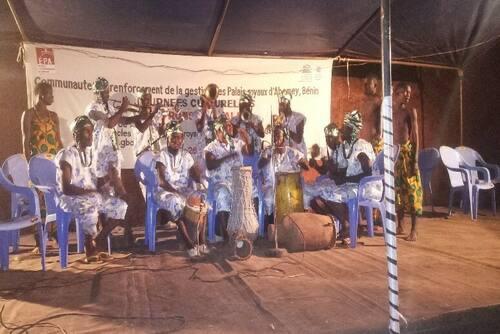The Anomaa Cultural Group delivered captivating performances to celebrate its 5th anniversary with dance and music in Cape Coast, in the central region of Ghana, Friday night. Over the years, the group hEntertainment as addressed social issues such as poverty, HIV/AIDS, and gender-based violence through their performances.
Dressed in animal-hide garments, the Anomaa Cultural Group delivered captivating performances showcasing the rich culture of Ghana’s traditional culture as the art troupe celebrated its 5th anniversary with dance and music, Friday night. It is worth mentioning that the group engages society in educational activities centered on cultural heritage.
“We strive to achieve this through traditional songs, dramas, poetry, and music, particularly our style known as Ananse nkonyaa,” said thea leadership of the group.
Ananse nkonyaa, in the indigenous twi language, reflects the on the ways of the legend of Kwaku ananse, a mythical character at the center of the Akan people of Ghana’s culture which form part of socialization and instilling uprightness among people, especially the youth. The dance techniques include sliding and stomping of feet, accompanied by various body movements and singing.
Over the years, the group has addressed social issues such as poverty, HIV/AIDS, and gender-based violence through their performances.
Founded on the bases of unity, the troupe also sought to promote national unity and cultural diversity.
“Society sometimes is engulfed with problems, and our group hopes to shift mindsets and habits by intertwining culture with contemporary life,” the leader said.
While Anomaa’s ideology has remained consistent over the years, the group, which has grown close to 20 members, has also evolved into an income-generating venture. The troupe also sustains its activities through fundraising events, concerts, and performances at corporate functions. They explained that the funds are reinvested into the group after paying members and deducting cost.
Over the years, the group has transformed the lives of many young people. Some of the members explained that they joined Anomaa Cultural Group to enhance their knowledge of Ghanaian traditional culture. This is tru becayse there’s limited opportunity to explore cultural history in many modern households in Ghana and Africa at large.
The the director of National Heritage and Culture Programs in the Ministry of Education, Arts, and Culture, said that cultural groups are vital for transferring cultural skills across generations and nurturing soft skills such as teamwork, management, and discipline.
Anomaa Cultural Group has also instilled pride in its fans and provided them with opportunities. The group has toured and performed in almost every region in the country this year, two members served as cultural judges at the Bibiani Talent haunt.
Sustaining a cultural group comes with challenges, including limited space to practice and financial resources, according to them. “Our remedy is networking and forming partnerships within the cultural sector,” they said.
In the interim, looking ahead, the group hopes to expand its operations by maximizing the tourism sector and going on tours outside the country


